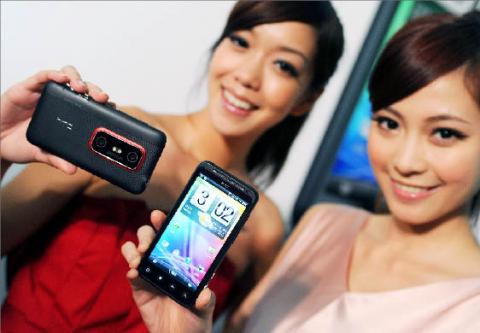The patent row between HTC Corp (宏達電) and Apple Inc has escalated as the Taiwanese firm filed a new lawsuit against its archrival on claims that it violated HTC’s patents with iPhones, iPads, iPods and Mac computers.
HTC is seeking unspecified damages and a ban on the use of three patented technologies by Apple.
The Taiwanese firm, the world’s No. 5 smartphone brand, filed a complaint with the US International Trade Commission (ITC) and the US District Court of Delaware for patent infringements, the company said in a statement yesterday.

Photo: Sam Yeh, AFP
“We are taking this action against Apple to protect our intellectual property, our industry partners, and most importantly our customers that use HTC phones,” HTC general counsel Grace Lei (雷憶瑜) said in the statement. “This is the third case before the ITC in which Apple is infringing our intellectual property. Apple needs to stop its infringement of our patented inventions in its products.”
The patents at dispute cover a range of functionality in Apple’s Mac computers and mobile devices that are essential to the user experience, the statement said.
These include Wi-Fi capability that allows users to wirelessly network multiple devices at home, at work or in public; and processor communication technology that enables the seamless integration of a personal digital assistant and a cellular phone into a single device providing users with a true smartphone experience, it said.
HTC and Apple have tangled in a spate of lawsuits going back to March last year.
Apple filed its latest complaint against HTC with the ITC and District Court in Delaware last month in connection with five cases linked to the technology used in iPads and iPhones.
A few days later, the ITC gave an initial ruling on March last year’s case, finding that HTC had infringed upon two patents belonging to Apple — a verdict that HTC has said covered “two minor patents.”
The ITC will make a final ruling in December and HTC is expected to reach a settlement with Apple by then, or in the worse case face a ban to stop selling its smartphones in the US.
Apple has sued many rivals, including HTC and Samsung Electronics Co, over patent infringements in several countries. It has also been countersued by rivals.
HTC chief financial officer Winston Yung (容覺生) said on Monday that the company has provisions set aside for the lawsuits.
He also reiterated CEO Peter Chou’s (周永明) views that the litigation was merely a “disturbance” on the company’s road to greater success, and that investors could be assured that HTC would not be put in a “dangerous situation.”
“We are fully prepared for any scenario,” Yung said.
Separately, HTC launched its first 3D smartphone in Taiwan yesterday.
The Evo 3D, which is already on sale in the US, carries a 4.3-inch touch screen and allows users to capture and play images that come across as being three-dimensional without the need for specially designed glasses.
The cellphone, which costs NT$21,900 (US$760), uses Google Inc’s Android 2.3 platform and enables users to browse 3D images or play games in 3D.
Shares of HTC closed down 3.14 percent yesterday at NT$801 on the Taiwan Stock Exchange.

BYPASSING CHINA TARIFFS: In the first five months of this year, Foxconn sent US$4.4bn of iPhones to the US from India, compared with US$3.7bn in the whole of last year Nearly all the iPhones exported by Foxconn Technology Group (富士康科技集團) from India went to the US between March and last month, customs data showed, far above last year’s average of 50 percent and a clear sign of Apple Inc’s efforts to bypass high US tariffs imposed on China. The numbers, being reported by Reuters for the first time, show that Apple has realigned its India exports to almost exclusively serve the US market, when previously the devices were more widely distributed to nations including the Netherlands and the Czech Republic. During March to last month, Foxconn, known as Hon Hai Precision Industry

Taiwan Semiconductor Manufacturing Co (TSMC, 台積電) and the University of Tokyo (UTokyo) yesterday announced the launch of the TSMC-UTokyo Lab to promote advanced semiconductor research, education and talent development. The lab is TSMC’s first laboratory collaboration with a university outside Taiwan, the company said in a statement. The lab would leverage “the extensive knowledge, experience, and creativity” of both institutions, the company said. It is located in the Asano Section of UTokyo’s Hongo, Tokyo, campus and would be managed by UTokyo faculty, guided by directors from UTokyo and TSMC, the company said. TSMC began working with UTokyo in 2019, resulting in 21 research projects,

Taiwan’s property market is entering a freeze, with mortgage activity across the nation’s six largest cities plummeting in the first quarter, H&B Realty Co (住商不動產) said yesterday, citing mounting pressure on housing demand amid tighter lending rules and regulatory curbs. Mortgage applications in Taipei, New Taipei City, Taoyuan, Taichung, Tainan and Kaohsiung totaled 28,078 from January to March, a sharp 36.3 percent decline from 44,082 in the same period last year, the nation’s largest real-estate brokerage by franchise said, citing data from the Joint Credit Information Center (JCIC, 聯徵中心). “The simultaneous decline across all six cities reflects just how drastically the market

Ashton Hall’s morning routine involves dunking his head in iced Saratoga Spring Water. For the company that sells the bottled water — Hall’s brand of choice for drinking, brushing his teeth and submerging himself — that is fantastic news. “We’re so thankful to this incredible fitness influencer called Ashton Hall,” Saratoga owner Primo Brands Corp’s CEO Robbert Rietbroek said on an earnings call after Hall’s morning routine video went viral. “He really helped put our brand on the map.” Primo Brands, which was not affiliated with Hall when he made his video, is among the increasing number of companies benefiting from influencer